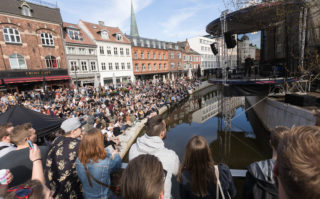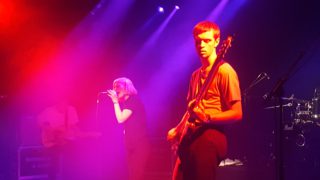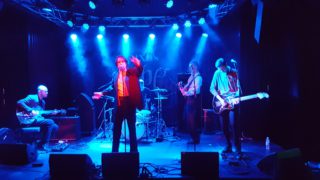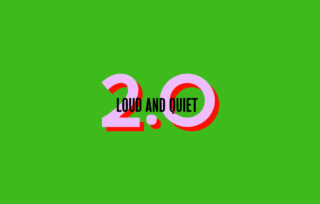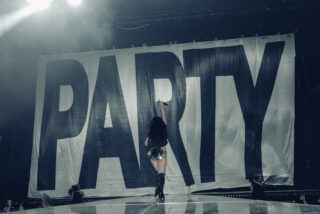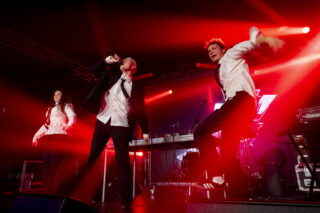Marching Church, the once side-project of Iceage’s Elias Rønnenfelt and now very much their own full other band, are most certainly a group worth sticking around for. Playing a mid-afternoon slot whilst the sun swelters those outside under its rays, Rønnenfelt and co. brew up a crepuscular force in the nightly-black room.
Rønnenfelt, looking ever more Nick Cave-like by the day, howls his way through the set in his characteristic tone that is half-slurred drunken lullaby and half enraged bitterness. It’s a combination that’s both affective and alluring, even more so when backed with his band that run flush tight, moving between slow, smoky grooves with malevolent and brooding basslines to discordant and out of step guitars and thundering drums that all unite to create a hypnotically jarring assault that crashes in and out like furious waves against a sea wall. Ellis May’s piano-led soundscapes recall the melancholic joy of Portishead and whilst her voice, backed by sparse and delicate shimmers of electric guitar, can be a restrained and breathy exploration of texture, she also has the ability to let it soar as it rises above the foggy atmospheres, revealing a powerful and piercing vocal to create an engulfing presence.
Thankfully the constant venue-hopping means you take in plenty of the city, which is genuinely beautiful and a pleasure to be in. The festival itself is scattered across an enormous amount of venues – that most major UK cities would struggle to match in terms of number and quality – and often dotted between these are pop-up bars that line the street and food stalls with some areas becoming a self-contained mini get together in their own right.
Such as the Godsbanen area, which is a series of old industrial buildings, shipping containers built on top of some wastelands around a former railway freight yard, turned it into a bustling cultural focal point filled with small businesses, markets, concerts and street food that feels like wandering through an American trailer park but is instead filled with fancy coffee places and glowing shirtless Danes playing volleyball on the sand court. One stage is even constructed over a canal, with groups playing out into the streets as a mixture of young kids with street beers and people sat in the many various cafes and restaurants look on. It’s an excellent use of space in a city that feels full of them.
The rest of the festival is pretty much owned by pop music. There’s a clear Bjork influence to Lydmor but with the force of a band with her the room-busting crowd is shown a back and forth between emotive balladry, straight-up pop and harsh eruptions of electronics that sputter and spark wildly. Sigrid, who’s excellent ‘Don’t Kill My Vibe’ EP has just been released, already feels destined for true pop stardom.
The 20-year-old may look several years younger than she is but she bounces around on the stage with utter assuredness and conviction. She performs with an almost manic intensity at times, eyes locking into the crowd like an opponent psyching themselves up for a big fight yet as soon as the song ends she is awash with smiles, humility and sincere gratitude for the audience’s presence. It’s a dichotomy that is not only present in her performance but in her voice too: she can seamlessly move from pristine eloquence to a raspy, snaring bite in the switch of a beat and she frequently does with glee. ‘Fake Friends’, ‘Plot Twist’ and ‘Don’t Kill My Vibe’ are glorious, rousing knockout tracks and are as infectious as they are innovative as they are fun. There’s just enough time to catch a glimpse of the excellent Omar Souleyman bringing his Syrian rave to a close before the weekend ends.
To suggest that Spot festival is a serious competitor to any of the other many, many major European festivals that exist would be a lie but what it truly is, is an alternative. Especially during a time in which festival line-ups are becoming increasingly uniform to the point of being indistinguishable. What Spot manages to do is create something truly different to explore and experience that many other festivals aren’t, which is a glimpse of what potential future headliners from Scandinavia may look like. Which is almost certainly going to be in the form of excellent young women making gloriously wonky but composed pop music.
Spot Festival, Aarhus, Denmark, 4-7 May 2017
Photos by: Allan Høgholm Photography and Naomi Bowman




